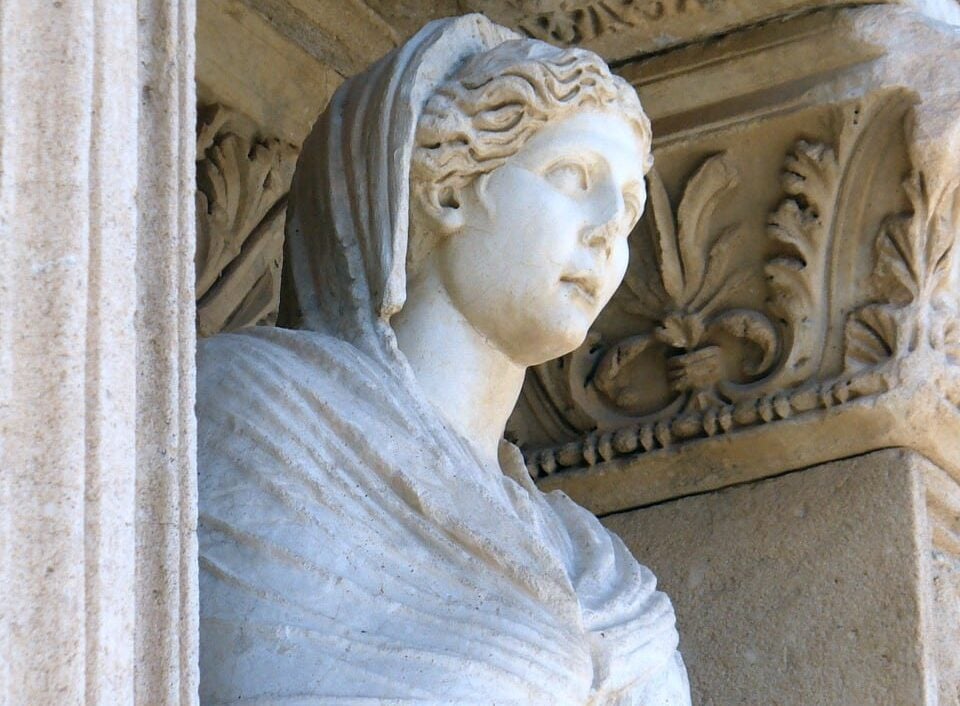

When you picture ancient Greek philosophers, it’s usually bearded guys like Plato or Socrates doing all the “hard work.” But a woman named Arete of Cyrene played a crucial role in shaping ancient Greek philosophy, and has not received the fame and recognition she deserves.
Arete was a fascinating personality who inherited and ran her father’s entire school—a school, interestingly enough, all about pleasure. In a world where men dominated public thought, Arete’s story offers a rare look at female intellectual leadership at a time when it was incredibly uncommon.
Arete came from Cyrene, a bustling Greek city on the Libyan coast of North Africa, likely born sometime in the late 5th or early 4th century BC. You could say philosophy was her family business. Her father, Aristippus, had studied under Socrates himself before founding his own school, the Cyrenaics. Their big idea? Hedonism. Not necessarily the glum, navel-gazing sort of philosophy, but one arguing that immediate, tangible pleasure was life’s highest aim and a human’s first priority. Think sunshine, good food and feeling good right now in the moment. It must have made Cyrene an interesting place to discuss deep thoughts at a time when the Libyan coast was thriving.
Details about Arete herself are frustratingly rare, mostly passed down centuries later by writers like Diogenes Laërtius. But the fragments we have give us a good idea about Arete’s contributions to this philosophical movement.
Aristippus immersed his daughter in his pleasure-focused philosophy. Interestingly, when he died, Arete reportedly took the leadership of the Cyrenaic school. Woman-lead philosophy schools in ancient Greece are a often-forgotten detail, but it speaks volumes about her courage and reputation.

What was Arete of Cyrene teaching as the head of the family business focusing on Greek philosophy? Almost certainly, it was the core ideas of her father’s Cyrenaic school, likely incorporating her own beliefs along the way.
Cyrenaic hedonism was smarter than a superficial suggestion for indulgence. It was about actively seeking positive, immediate sensations—especially physical ones, which they saw as more intense and reliable than mental states or just avoiding pain (a key difference from the later Epicureans). It also involved the wisdom and judgment to pick pleasures that wouldn’t come back to bite you later—a kind of practical guide to feeling good without messing up your life.
The school’s followers believed that pleasure was best achieved through discipline, knowledge, and virtuous behavior. Conversely, they thought negative emotions like anger and fear only increased pain. This idea of weighing pleasure and pain is articulated well in Plato’s “Protagoras,” where he suggests that success in life depends on a “science of measurement” for these feelings.
Perhaps Arete’s most concrete and lasting contribution in this school comes through her son, Aristippus the Younger. She taught him the family philosophy so effectively that he became known as “Metrodidaktos”—literally, “Taught by his Mother.” That nickname alone tells you she wasn’t just a woman who ran a business; her contemporaries recognized her as a serious philosophical authority capable of passing down complex ideas. Ancient sources even claim she wrote approximately forty books. Forty! Sadly, none survive today, so this claim cannot be verified by archaeological evidence. Just imagine the lost knowledge—essays on ethics, logic, and perhaps practical advice on living well (and pleasantly), all from a leading woman thinker of the early Hellenistic era, who defied societal norms and built her own reputation.

You might ask, why should we care about a philosopher whose writings are lost and whose school eventually faded out?
For one, Arete herself makes us rethink the historically male-dominated picture of ancient Greek intellectual life. She serves as historical proof that women were actively thinking, teaching, and leading, despite being scarcely acknowledged in history books where misogyny pervaded these societies. Her position as a leader of a ‘hedonist’ school also raises intriguing points about women, their agency and ancient Greek perceptions on how to define happiness—issues we still argue about today.
And let’s face it, the core questions the Cyrenaics tried to deal with haven’t exactly gone away. What is happiness? How important is feeling good right now? Where’s the line between enjoying pleasure and acting prudently? Look around at modern consumer culture, the wellness industry’s obsession with “feeling good,” or even the ethics surrounding those dopamine hits we get from our mobile phones and social media. The delicate balance between living for the moment and considering long-term consequences is something Arete of Cyrene undoubtedly explored with her students.
Her story, as well as the Cyrenaic view overall, helps us think about our own definitions of a ‘good life.’ Are our modern priorities and interpretations of happiness aligned with what people believed back then?
Arete of Cyrene is therefore a fascinating yet mainly forgotten figure from the long list of ancient Greek philosophers. We don’t have her own words, but the accounts of her leadership and teaching reveal an exceptional woman who was so capable that she managed to realign and shape deeply the philosophical world around her. She ran a school, passed on its teachings (earning her son a unique nickname in the process), and wrestled with fundamental questions about human desire, all while challenging societal norms about the role of a woman. Maybe, as Arete might have suggested, one of the keenest pleasures is finding truth and wisdom, no matter who it comes from.
